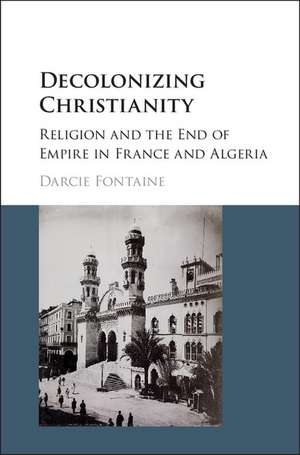Decolonizing Christianity: Religion and the End of Empire in France and Algeria
Autor Darcie Fontaineen Limba Engleză Hardback – 19 iun 2016
Preț: 553.25 lei
Preț vechi: 719.01 lei
-23% Nou
105.87€ • 115.46$ • 89.27£
Carte indisponibilă temporar
Specificații
ISBN-10: 1107118174
Pagini: 251
Ilustrații: 5 b/w illus.
Dimensiuni: 160 x 235 x 20 mm
Greutate: 0.51 kg
Editura: Cambridge University Press
Colecția Cambridge University Press
Locul publicării:New York, United States
Cuprins
Recenzii
'Decolonizing Christianity is a most welcome addition to histories of empire, religion, and politics. It is a must-read for historians of France and Algeria, scholars of the new imperial history, and social and intellectual historians interested in contextualizing Christianity.' Minayo Nasiali, French History
'Decolonizing Christianity is a detailed and well-researched book, which clearly succeeds in demonstrating the importance of Christianity to debates about Algerian independence on a whole host of levels. Its range is, quite simply, impressive: it moves seamlessly between Algeria, France, Vatican II and the World Council of Churches, covering Catholics and Protestants, metropole and periphery, procolonial and anti-colonial Christians. Its scholarship is equally strong: the large quantity of archival evidence is supported by twenty oral interviews, and extensive reading of the relevant anglophone and francophone historiography.' Sam Brewitt-Taylor, The Journal of Ecclesiastical History
'Darcie Fontaine's Decolonizing Christianity examines the history of Christianity in colonial Algeria, and the ramifications of decolonization on a local and global scale. It alternates between close historical details, as it narrates the lives of individual Christians living in Algeria, and broad theoretical discussion, as it shows how decolonization drove reforms of 'global Christianity' in the twentieth century. Balancing a challenging combination of minute detail and broad debate, this work paints a compelling and well-articulated portrait of decolonization and Christianity that will be of interest to a wide range of readers.' Erin Twohig, Contemporary French Civilization
'Decolonizing Christianity demonstrates the deep ties between religion and politics in France and its North African colony, as well as the reciprocal nature of theological debates across the Mediterranean. But if the book adds to a growing literature on religion and decolonisation, it makes an equally important intervention into the history of Algerian independence. Fontaine is careful not to recreate a totalising narrative of Christians' engagement in the war; in so doing, she offers a more complex and pluralistic history of Christian activism, the broader settler community, and the young Algerian state's attitude toward its religious minorities.' Terrence G. Peterson, The Journal of North African Studies
'In tracing the relationship between religion and politics across a broad timeframe while simultaneously connecting developments in Algeria to those within metropolitan France and global Christianity, Fontaine draws together geographical and chronological frames of analysis usually kept separate. This allows her to fulfil her stated objective of 'provincializing Christianity' without decontextualising it. However, the most compelling sections of the book are the ones that tell the story on the ground in Algeria. This reflects the archive-based fieldwork and oral histories Fontaine undertook in Algeria, which add much to her original and engaging study.' Clare Eldridge, Modern & Contemporary France
'The book's merits are its details and its descriptions of a wide array of Christian organizations. The author's archival research is especially commendable.' Phillip. C. Naylor, The American Historical Review
'Decolonizing Christianity offers a compelling look at the decades surrounding Algeria's independence that makes excellent use of private Algerian archives and contributes to a growing body of literature on Christianity's encounter with the end of empire, at an institutional and individual level.' Naomi Davidson, The Journal of Modern History
Descriere
Decolonizing Christianity traces the dramatic transformation of Christianity from its position as the moral foundation of European imperialism to its role as a radical voice of political and social change in the era of decolonization. As Christians renegotiated their place in the emerging Third World, they confronted the consequences of racism and violence that Christianity had reinforced in European colonies. This book tells the story of Christians in Algeria who undertook a mission to 'decolonize the Church' and ensure the future of Christianity in postcolonial Algeria.
But it also recovers the personal aspects of decolonization, as many of these Christians were arrested and tortured by the French for their support of Algerian independence. The consequences of these actions were immense, as the theological and social engagement of Christians in Algeria then influenced the groundbreaking reforms developing within global Christianity in the 1960s.
